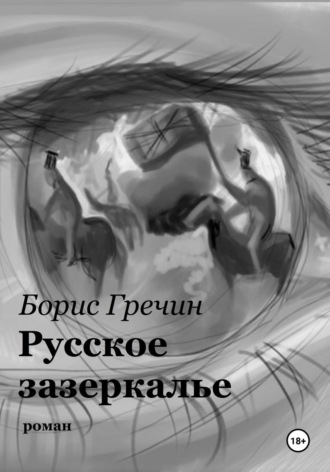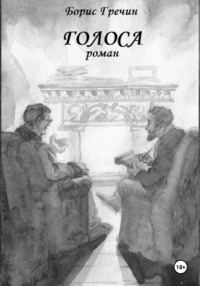
Полная версия
Русское зазеркалье
Let me dwell upon three or maybe four essential details of this song before we finish, the first of them being the musical genre it belongs to. Technically speaking, it is a waltz, and a very quiet one: it calms you down, it gives you a few minutes of deep relaxation that I guess a soldier in the frontline needs so much. Let me please share with you some personal, very personal details: twice in my life, I was very close to ‘deserting the army,’ to use the metaphor by Robert Louis Stevenson. It was some very calm and soothing songs that helped me go through these periods both times, ‘In a Frontline Forest’ being one of them. I do say that the song has an almost psychotherapeutic effect—on me, at least.
Do you know that its melody originates from Songe d’Automne, a waltz written in 1908 by Archibald Joyce, an English light music composer? This is exactly Songe d’Automne that the unnamed accordionist is playing and his comrades are listening to. The waltz in question was very popular in Soviet Russia before WWII, the Great Patriotic War, or simply the War, as Russians often call it. This brings me to my second thought, namely, that of the importance of music that literally builds bridges between cultures. I know that the thought has long become a banality—which fact doesn’t make it less true. The unknown Soviet soldiers were fighting to restore peace on earth that would allow them to go back to their beloved ones whom they first met when they went dancing along Songe d’Automne; it is, therefore, not very wrong to say that the waltz, written by a British composer, was a part of what they were fighting for. Is culture—or art—valuable in itself? What or whom would you rescue from a burning house: a Nazi, a Rembrandt, or a cat? A great question which is falsely attributed to Marseille Proust—in fact, it was Alberto Giacometti who authors it. I will be happy to learn your answers to it in less than twenty minutes.
Whichever way you answer it, the very fact that the unknown Soviet soldiers were eager to sacrifice their own lives for the sake of a waltz—this fact may take your breath away. Things are not that Kafkaesque, of course: this waltz requires a world where waltzes, written by British composers, still can be played, this world being exactly what the soldiers were fighting for. We are completely unable to empathise with their state of mind, to reflect it in our mind as long as we refuse to deal with the concepts of duty and sacrifice. It is precisely the readiness to sacrifice your own life that makes even your death—‘in fire, in smoke’—a relatively simple matter. Can we still deal with this concept, though, ‘over-intelligent’ as we are? Are we up to it? The world we live in has become a very safe place over the last fifty years. In the world of today, it is no longer needed to sacrifice one’s own life, and the idea that each human life is invaluable has long become a commonplace with us. What if it is not? What I mean to say is: aren’t there some things that are still more valuable than the life of an individual?
Duty is another very important word whose meaning we probably are unable to understand as long as we do not reject our individualism, as long as we pretend that it is this very individualism that is ein feste Burg, a mighty fortress of our weltanschauung. Over the last century, the word duty became somewhat pale: we do not use such phrases as ‘your sacred duty is to give up your life for the sake of your own country’ any longer. We instinctively feel that there is too much pathos in them. We are simply not up to this pathos, so we just call such phrases ‘pathetic’—forgive the unintentional pun. We seem to fully misinterpret the very concept of duty which we see as something external, as a task that can be forced upon a person. When a teacher says that an essay is ‘due tomorrow’ he or she means that he or she is able to academically penalise those students who won’t submit their compositions by tomorrow and that he or she most certainly will do so. It works very nicely with things that are less important than your life, but this reading of the concept becomes impossible when it is your life that is asked from you. You absolutely cannot force a person to sacrifice his or her life for whichever sake because you have no means of coercion, the most severe punishment that you can impose on this person being his or her execution—but you have asked for his or her life, anyway. Strange as it seems, duty, in the loftiest sense of this word, is based entirely on our free will to transgress the boundaries of our personality—of our individualistic self, rather. (Please give some examples of people who you think have transgressed the boundaries of their selves.) ‘Jeder stirbt für sich allein’, ‘Every Man Dies Alone,’ or, maybe, ’Dies for His Own Sake,” to remember the title of Hans Fallada’s famous novel. But ‘we do not live alone’ (I am quoting a character from An Inspector Calls, a meaningful play by John Boynton Priestley who was an English novelist, playwright, screenwriter, broadcaster and social commentator), and we cannot possibly live for our own sake only, however much the mainstream mass media would try to convince you in the opposite. Some of us, who fully understand that they do not live alone, are lucky enough to dispose of their own death, making it either a death ‘für sich allein,’ for their own sake, or a meaningful death for the sake of other human beings.
The world of today has become a very secure place (I believe I have already said that) which is sort of an aquarium with glass walls being either police ensuring public security or modern medicine protecting us from any diseases long into our old age. It is precisely this aquarium that gives birth to some very bizarre forms of hedonistic life (such as homosexualism en masse, for instance). I am afraid these glass walls will be torn down, sooner or later. We are—and here comes another quotation from the same play by J. B. Priestley—
… members of one body. We are responsible for each other. And I tell you that the time will soon come when, if men will not learn that lesson, then they will be taught it in fire and blood and anguish.
And if it ever comes to the destruction of this aquarium it will be the Soviet soldiers listening to Songe d’Automne whom we can learn valuable things from.
‘Good night!’ says the inspector after he has finished his scornful tirade. ‘Let us make a break before we deal with your answers to my questions,’ says your humble lecturer.49
~ ~ ~
Есть много способов семинарской работы со студентами. Вы можете спрашивать желающих или по списку, или, к примеру, использовать детскую считалку, чтобы определить следующего, или взять маленький резиновый мячик и дать его первому отвечающему, чтобы он потом сам передал мячик кому угодно. Все эти способы, увы, не работают, если студент упрямо отказывается отвечать. С Патриком на третьем семинаре случилось именно это: ближе к концу моей лекции он вырвал из блокнота лист бумаги и принялся писать. Мы перешли к обсуждению, а он всё писал, на любую попытку узнать его мнение по тому или иному вопросу отделываясь фразой вроде
[сноска дальше]:
– I would rather skip this question, sorry.
Это не вызвало никакой реакции на первом вопросе, но к второму появились улыбки, а к третьему и приглушённые смешки. Конрад демонстративно-комично попробовал вытянуть шею, чтобы заглянуть в эту записку – Патрик прикрыл её рукой, что, конечно, спровоцировало новое веселье.
Обсуждение шло своим чередом – иногда мне приходилось комментировать откровенные глупости, иногда попадались очень умные, даже зрелые ответы, – и мы добрались в итоге до последнего вопроса. Патрик, слегка вскинув руку и неопределённо махнув пятернёй в воздухе, приподнялся с места и протянул мне исписанный листок бумаги.
– You don’t want to read it aloud, then? – уточнила я.
– No, not really. I st-stammer a bit, – ответил Патрик с серьёзным лицом. Новый смех, и я тоже невольно улыбнулась: он раньше не был замечен в заикании. Патрик и ухом не повёл: то ли получал удовольствие от того, чтобы быть комиком группы, ведь хорошие комики своим шуткам не смеются, то ли демонстрировал, как мало ему интересно, что о нём думают.
Я взяла листок из его рук, пробежала глазами наискось и прикусила, сдерживая улыбку. Заметила вполголоса:
– Or maybe you simply don’t have the courage to read it aloud…
– Yes, sure, because I am not Leo Tolstoy who commands, ‘B-b-battery, fire!’ – откликнулся Патрик, вновь ко всеобщему удовольствию.
Что же, перед лицом вызова нельзя прятать голову в песок, так меня научили… Откашлявшись, я отчётливо произнесла:
– I appreciate your tact, Patrick, but I think that your answer provides enough food for thought to be read aloud, and I also repeat that honest confrontation is better than dishonest harmony – just you try to stop me! – прибавила я, увидев, что он открыл рот, чтобы возражать, и начала читать вслух.
An example of a person who transgresses the boundaries of her personality is Ms Alice Florensky, a visiting professor at the College of Contemporary Music in London. Below, I explain four ways of how she does it.
Ms Florensky is a war-monger, firstly. She justifies the civil war in Ukraine and probably the annexation of Crimea, saying that it is Russia’s own affair or maybe an act of self-defence. She justifies military propaganda, saying that it serves the good cause, and she actually poses herself as a propagandist. Perhaps she even is one.
Ms Florensky, secondly, belittles pacifists in general and the Russian anti-government intellectuals in particular, those very people who are the only decent people in Russia we can shake hands with.
Thirdly, she is openly homophobic, without even thinking of the fact that her homophobia intimidates her homosexual students. (I must note in parenthesis that there is no such word in our language as homosexualism, not any longer, because it is not a disease to be categorised as an ‘-ism’.)
And, last but not least, her lectures in general are brilliant rhetorical exercises rather than real academic talks covering essential matters.
Unfortunately for her, what she sees as boundaries of her personality can be seen by others as boundaries of common sense and common propriety.
Всё время моего чтения раздавались отдельные, а иногда и дружные смешки или реплики вроде Hear, hear! – но к последней фразе, при всей её вежливости достаточно оскорбительной, они смолкли. Патрик слегка покраснел, но при этом держался уверенно: скрестил руки на груди, откинул назад кудрявую голову. Я отложила листок в сторону; слегка улыбаясь, прошлась немного перед первым рядом справа налево. Надо отвечать…
– Thank you, Patrick, it was brave of you, and I also appreciate your chivalrous attempt to save me from public disgrace that you imagined the reading of your note in front of the class would be, – начала я (смешки). – I think I would be able to reply to each of your objections—I must, in fact.
To begin with, people who live and die in the Donbass region see themselves as Russians. So yes, it is an act of our national self-defence to protect them. And yes, it is Russia’s own affair, because your army, my dear friends, has never been invited to the Crimea, neither today nor in 1853. Yes, I am a propagandist, who enjoys being in a good company of Christ, or Rev. John Bunyan, or Rev. Dr. Rowan Williams, or other such people defending Christian values.
Your very dubious assumption that the Russian anti-government intellectuals are the only decent people in Russia automatically excludes me from the number of the decent people whom you might want to shake hands with. (Смешки.) My dear Patrick, you don’t really have to shake hands with me, students don’t greet teachers this way, and you have also clearly forgotten to ask me if I want to shake hands with you.
Any attempts to accuse me of homophobia look to me as a very Stalinian method to prevent me from saying what I want to say—I must mercilessly turn them down and officially declare that your humble lecturer used to be a lesbian (сдержанные восклицания удивления или, возможно, одобрения)—and I used to be one in Russia where any attempt to be a member of a sexual minority is in itself an act of civic courage. (Новые смешки.) Now, I, too, may be hurt in my feelings of a sexual minority member.
Fourthly, and lastly, I do admit that I sometimes digress from the subject of our lessons—but I absolutely disagree with you when you say that those digressions are just rhetorical exercises on my side. How are you supposed to know what is, or will be, essential? Not that I pretend to possess this knowledge… Do you really think that such concepts as war and peace, life and death, or sacrifice and duty versus hedonism and individualism are not essential and that the only thing which matters is the names of Russian song-writers and such? If you think so, you are free not to attend my classes, as I am utterly unable to teach you what you think is essential.
I do thank you all the same: it was a meaningful discussion.
Я коротко поклонилась в его сторону и, глянув на часы, прибавила:
– Our time is over, by the way. See all of you next week.
Кэролайн изобразила нечто вроде трёх хлопков – не знаю, в насмешку или искренне, – и пара человек к ней присоединилась. Ухмыляющийся Люк, легонько ткнув Патрика кулаком в плечо, выдал что-то вроде:
– Don’t try to argue with her, Patrick boy, you are not up to it…50
Я не слушала дальнейшего, потому что уже выходила из аудитории.
На первом этаже колледжа имелся студенческий кафетерий, то есть, говоря по-русски, столовая, но как столовая он не выглядел из-за стильных столов и стульев (здесь было четыре круглых стула и четыре квадратных, видимо, в соответствии с догмой политкорректности celebrate diversity51; будь здесь больше места, и треугольный обязательно бы втиснули). Я взяла Lunch pack («комплексный обед») за £5.79: сэндвич, суп в картонном стакане, чипсы, шоколадный батончик, яблоко – и отдельно большой кофе за фунт. Выходило, по студенческому тарифу, дешевле, чем питаться дома; для получения скидки позавчера дали мне наконец-то «карту сотрудника»: карточку размером с банковскую. Правда, не самая здоровая еда, чипсы особенно – но можно подумать, магазинная много полезней, а с готовкой заморачиваться я всё равно не буду, обленилась за три года… Ура, незанятый столик у окна, повезло! Надо теперь каждый раз отпускать их за три минуты до звонка… Сев за столик, я радостно вгрызлась в яблоко. Так и не удосужилась узнать у директорши, есть ли у них специальная столовая для преподавателей. Это вряд ли, конечно: тут же все демократы…
[Сноска дальше.]
– May I? – это был Патрик со своим подносом.
– Of course! – беззаботно откликнулась я. А он смелый, однако…
Некоторое время мы молчали. Я, закончив есть яблоко, размешивала горячий суп пластиковой ложечкой. Патрик, несколько раз откусив от своего сэндвича, глядел на него со смесью голода и отвращения. Отвращение победило: встав, он донёс его до мусорного ведра и выкинул. Эх, не учили этих деток беречь хлеб, не висели в их школьной столовой плакаты «Хлеб – всему голова»… Вернулся.
– Do you want my crisps? – предложила я (всё равно собиралась выбрасывать). Патрик аж вздрогнул:
– N-no, thank you, no! Er… you know, Ms Florensky, I didn’t want to be rude, actually.
–You weren’t, – невозмутимо отозвалась я – Nothing bad has happened.
– No, I mean… I knew how it all would end—that is, that you would defeat me on all points, but I still felt like I must, I absolutely must raise my voice and—
– And confront me?
– Yes! Not you exactly, don’t take it personally, please; you might be a nice person, after all, but—don’t you see that it is you who provokes us each time?
– A part of what a good teacher should do, probably.
– Probably, – согласился он, – but you just—you attack everything that is sacred to each sensible human being, to each Briton, I mean; you only touch on things, and they fall on earth, figuratively speaking, and break into pieces, and they break, and break, and break; and you crush everything!
– As a dinosaur, – предположила я с улыбкой.
– Yes—as a dinosaur, – согласился он без всякой улыбки.
– Don’t you think that it is not my fault that these ‘sacred’ things are so fragile? And what is sacred to you, by the way? – он так долго навязывал мне этот бой, что я решила перестать отшучиваться и принять его, наконец. – Is homosexuality sacred?
– Witty as everything you say, but not true. Is homosexuality sacred? Imagine, it is! As a part of our free choice, and it is our free choice which is sacred, not homosexuality. You know, Ms Florensky, I think you are the only person in this building who dares ask such a question to someone who is homosexual.
– You are homosexual, then? – поразилась я и прибавила вполголоса: – My poor darling…
Патрик, однако, расслышал – и нервно возразил:
– Sorry, but your ‘my poor darling’ sounds very insulting.
– Maybe it does, but, you see, it was not me who has started this conversation. I am not homophobic, not really; you keep forgetting that I, too, was a lesbian, so I have some experience in the field, – насмешливо прибавила я. (Как удачно совпало! Не то, чем можно гордиться, но никогда не знаешь, чем защитишься.) – Yes, I dare ask such questions, and I simply think that your homosexuality—now forgive me, please—is based exclusively on the fact that you have never met a really nice and sensitive girl. This is what I think of it, to be honest.
Про себя я с тоской подумала: сейчас вот вскочит этот Патрик с места и побежит жаловаться директору, как давеча американка, и тогда уж меня точно попросят с вещами на выход. Как грустно, как предсказуемо… Но нет, Патрик никуда не шёл: он остался сидеть на месте с приоткрытым ртом. А ещё он снова покраснел, и даже приметно.
– I am sorry! – тут же извинилась я ещё раз. – We will drop the subject and never mention it again. I am not a psychotherapist, and have never pretended to be one.
Патрик поморщился, что, видимо, изображало улыбку. Пробормотал:
– I should have listened to Luke in the first place; I shouldn’t have tried this conversation which turns out to be another massacre at Balaclava for me.
– On the contrary, it was a very nice chat, I have enjoyed it, – заметила я несколько легкомысленно.
– You did, of course! – это было сказано почти с гневом.
– I didn’t, actually, but… but I thank you again. You are a very nice… young gentleman, and you are nice to be in touch with, so please feel free to contact me on other… academic occasions.
Патрик вопросительно уставился мне в глаза. Переспросил, сомневаясь:
– You do mean it? There are many things I think I want to ask you—in your course, that is—but I often doubt whether it is proper…
– I do, – подтвердила я – и, достав из сумочки маркер для доски, быстро написала на пакете с чипсами адрес своей электронной почты. – This is my email, you can send your questions to it. Even personal questions if really necessary; I wouldn’t mind, – зачем-то прибавила я.
– Thank you, thank you so much! (Ура, всё-таки сбагрила пакет с чипсами!) Er… I’d better be going?52
Я кивнула, улыбаясь. Проводила взглядом его нескладную фигуру. Да, мы ведь все в его возрасте были такими же: самоуверенными и страшно робкими при этом, очень умненькими и не очень умными, по-солдатски прямолинейными внешне и страстно ждущими нежности втайне. Стоит только нырнуть в глубокие и холодные воды памяти – она всё хранит…
* * *
…Да, мы с Наташей действительно стали, что называется, «близки», правда, не тогда, а несколько позже, в начале ноября. На ноябрьские праздники иногородних отпустили домой, а я эти дни провела с подругой. (Мама не была против того, что я не приехала на выходные, а отец… отцу я не смогла дозвониться, а решение пришлось принимать быстро. Да и потóм: какая девушка в семнадцать лет добровольно захочет снова под родительский надзор?)
Случись это всё раньше, настолько же раньше я, наверное, охладела бы к православию. Верней, не так: я не охладела потому, что никогда и не была особенно горяча. Просто в начале ноября я окончательно прекратила попытки жить церковной жизнью и соотносить свои мысли и поступки с церковным учением. Мне было стыдно. Я чувствовала, хоть не знала, как назвать, что мы с Наташей делаем что-то дурное, срываем некий незрелый плод, который не мы и не так должны срывать; изображаем суррогат того, что может быть между мужчиной и женщиной, да ещё и с серьёзным выражением лица называем этот суррогат «отношениями»: как если бы игроки в пейнтбол без тени иронии считали «боем» свою игру, от которой нельзя умереть. С другой стороны, даже и этот суррогат очень хотелось попробовать: не столько по физиологической причине, сколько по причине его новизны. А ещё была в этом дерзость пересечения черты недозволенного, и эта дерзость для молодой девушки в «благонравном» окружении бывает, как ни крути, очень сладостна. Наташа-то эту черту пересекала почти каждый день – и своими вызывающими значками, и репликами на грани приличия, – а я была девушкой более робкой, вот мне и оставалась только эта потаённая возможность. Достоевский с вызывающей содрогание точностью увидел эту склонность молодых девушек у Лизы Хохлаковой в главе «Бесёнок» «Братьев Карамазовых». Будь у Лизы смелая подруга её возраста, боюсь, то, что я попробовала, его героиня тоже бы попробовала. Кстати, про Лизу Хохлакову я тогда вспомнила – и это испортило мне настроение на весь день, в течение которого я практически не общалась с Наташей. Ненадолго же меня хватило… Впрочем, это воспоминание имело один положительный результат: я для себя решила, что, по крайней мере, «не буду есть ананасовый компот, наблюдая за распятым мальчиком», то есть не зайду в своём пересечении границ недозволенного куда-то очень далеко. И… церковь, как не сумевшую ответить моим нуждам и чаяниям, тоже проклинать не буду.
Больше того: неделю или две я в своей голове носила новый образ, образ «грешницы, но христианки», и даже стала конструировать некий проект «обновлённой» на западный манер православной церкви, где, во-первых, было бы позволено женское священство, во-вторых, откуда бы не изгонялись женщины и девушки с такими, как у меня, кхм, предпочтениями… (Не предпочтениями, неверное слово, а практикой поведения: вы ведь не говорите про кого-то, кто пришёл в магазин за хлебом, а вынужден покупать сухие и безвкусные как картон хлебцы по причине отсутствия нормального хлеба, что это его «предпочтения», правда?) И как бы не я возглавлю эту новую церковь, став лидером общественного мнения, мечталось мне тогда… (Как хорошо, что больше десяти лет прошло с тех пор: уже не так стыдно вспоминать.) Параллельно с этими горделивыми мечтаниями и не усматривая никакого противоречия им, я всерьёз разрабатывала мысль о том, чтобы покаяться в этом «плотском грехе» на исповеди, и как бы даже не отцу Вадиму. Но отказалась, к счастью. Отцу Вадиму покаяться, конечно, было можно, но имелось бы в таком покаянии ему, непорочной овце Христовой, что-то от бравады, от ещё одного извращённого удовольствия шокировать невинного человека (недаром же Лиза Хохлакова именно Алёше, бывшему послушнику, рассказывает свои нездоровые мечтания) или, как минимум, от душевного стриптиза, от торговли страданием напоказ – и зачем, спрашивается, усугублять одно не очень хорошее дело вторым, совсем уж нехорошим? А вариант пойти в другой храм, не в наш, домóвый, я даже не рассматривала, предчувствуя, что покаяние-то на меня наложат, а понимания, скорее всего, не проявят и как быть, тоже не скажут. Ведь я уже вступила в эти отношения – так можно ли их бросить, тем более что у меня и повода никакого не было их бросать? Насколько честно – перестать делать что-то явно дурное, но то, что ты уже добровольно пообещал делать? Насколько допустимо, к примеру, для новобранца гитлеровской армии дезертировать с поля боя, если он уже принёс воинскую присягу? И насколько обычный батюшка задумывается о таких вещах, насколько он готов давать ответы на эти вопросы? Может быть, и задумывается, может быть, и готов, но рисковать я не хотела. Нет, нужен мне был зрелый, опытный, умный, деликатный священник, кто-то вроде моего отца… но не отцу же, в самом деле, в этом признаваться! (От самой мысли волосы вставали дыбом.) В конце концов, я ему тогда, в кафе, уже покаялась, наперёд, а он меня наперёд простил, то есть будем считать так. Будем считать…






